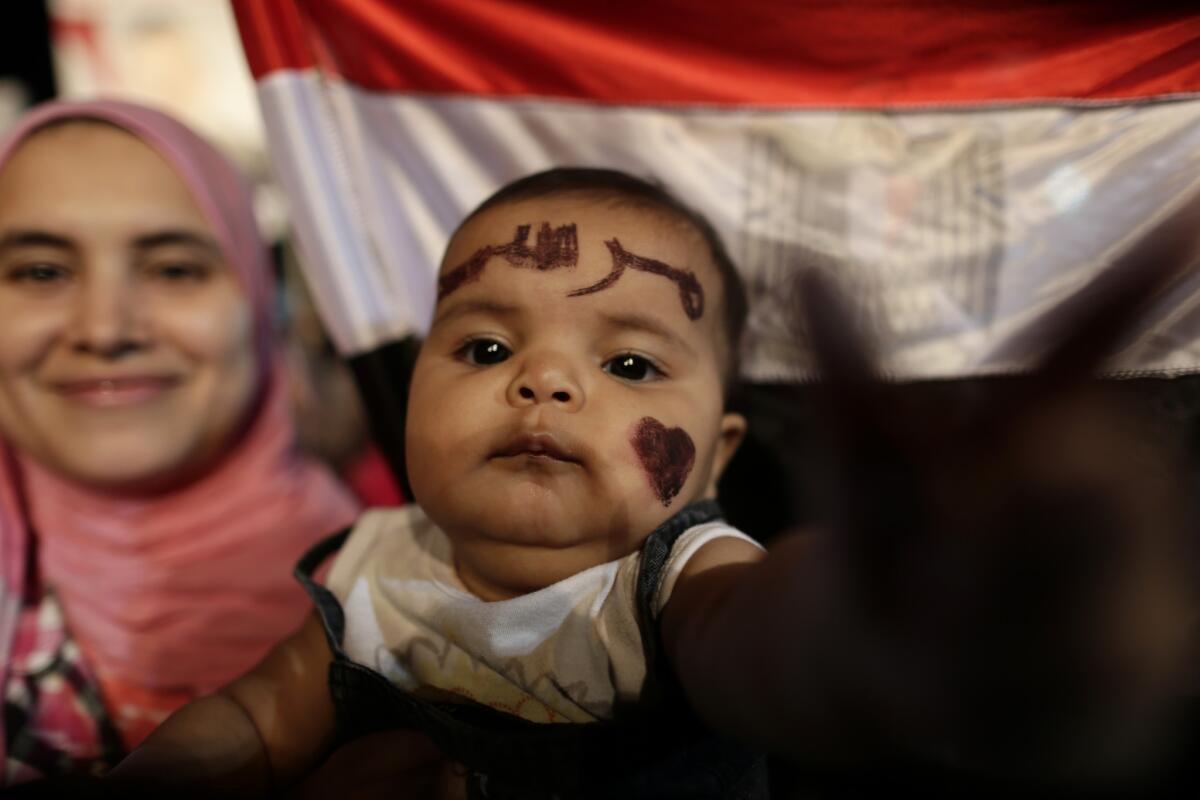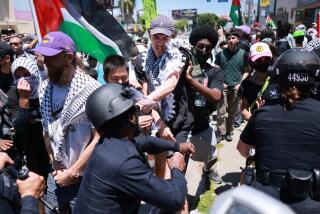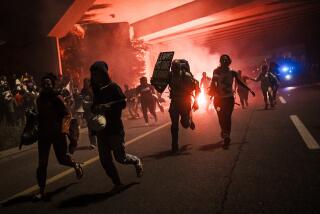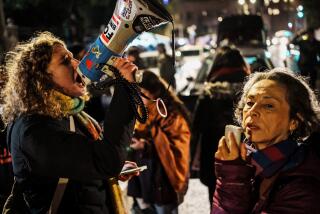Muslim Brotherhood defiant as pressure grows to halt Egypt sit-in

CAIRO -- Generators hummed, laundry billowed, men fortified barricades, and boys -- one with a gas mask dangling from his neck -- played soccer amid escalating calls by security forces to break up the sit-in at the Rabaa al Adawiya mosque.
Prayer rugs unfurled in the rising heat Thursday as men dripped with sweat and prayed. Doctors stacked medical supplies and Mona Abdelaal, three children at her side, vowed that her family was willing to die if former president Mohamed Morsi, deposed in a coup last month, was not returned to office.
“This protest is for freedom and legitimacy,” she said. “Our rights have been torn from us. It’s important that my children know the meaning of democracy. We’re not afraid of anyone or anything. If we have to die, even our children, we don’t care.”
Defiance among thousands of pro-Morsi supporters at Rabaa has heightened the prospect of bloodshed if security forces storm the sit-in, which over the last month has taken on the aura of a stubborn squatter camp. The military-backed government reiterated Thursday that it would break up the protest but there were no indications early in the day of an imminent police operation.
The politics and logistics of such a move are confounding. Morsi’s Muslim Brotherhood group, which organized the sit-in, has left little room to negotiate, hoping to intensify international pressure on the government. The army has promised to crush what it describes as “terrorists” and could risk its reputation if it doesn’t quickly shut down the demonstration.
Such a mission would likely involve a massive push by security forces into a dense residential neighborhood crisscrossed by wide streets and narrow alleys that are cluttered with hundreds of tents and barricades of sandbags and bricks. Police and armed civilians killed at least 80 pro-Morsi supporters during a relatively small protest march on Saturday.
“If I go and ask the protesters to leave, do you think they will leave or will they fire at police forces as they do every time?” said a ranking security official who asked not to be named. “Hopefully things will be contained without having to resort to violence.”
Both sides are maneuvering to sway public opinion. Prosecutors said neighbors around the mosque have filed lawsuits, claiming the sit-in is a dangerous nuisance. But one man claiming to be from the neighborhood stood on the protesters’ stage Wednesday and said the people of the area supported the sit-in, which at night glows with green lasers and blowing banners of Morsi.
“A lot of people in this sit-in are not from the Brotherhood. I am not one of them, but we are not leaving until Morsi is reinstated,” said Islam Ali, a doctor. “Morsi was elected. He has the legitimacy of the ballot box. I refuse to live for 60 years under military rule, like my parents did.”
He added: “We have no weapons. Only sticks. Our biggest weapon is our commitment.”
That democratic principle is at the core of the protest, but the sit-in also reflects the deeper struggle between Islamists and the secular military over the nation’s identity. That question arose immediately after the 2011 uprising that overthrew longtime autocrat Hosni Mubarak. It remains central to Egypt’s political turmoil and has assumed an increasingly violent tone that has forced Egyptians into rival camps.
“Our weapon is God,” said Samir Sayed Abdel, a bearded man draped in headdress to keep out the sun. “Our next step is to hang onto God. We are good people, not bad. God is our only judge.”
The government’s warning has little effect on Abdel and thousands of others at the sit-in. Protesters washed in buckets, boys swept the pavement and men wearing backpacks roamed the grounds, spraying water on those praying. Pictures of the fallen hung, along with signs that read: “We do not surrender, we win or we die.”
That tenacity has evoked a similar, if opposite, resolve from the pro-military camp, which is calling for swift action against the Brotherhood.
“We demand the government and other state institutions be fully committed to strict legal measures while confronting the outlaws and terrorist elements that use religion as a cover, and call for international intervention,” said the National Salvation Front, an umbrella organization of mostly secular parties.
The Front said that the massive rallies on June 30 that led to the coup against Morsi were a repudiation of the “Brotherhood’s fascist ideology, its repressive practices and indifference towards Egypt’s present and future.”
ALSO:
House votes for new tough sanctions against Iran
U.N. team to probe sites of reported Syrian chemical weapons use
Al Qaeda leader vows to free Muslims from U.S. prisons, Guantanamo
jeffrey.fleishman@latimes.com
Special correspondent Ingy Hassieb contributed to this report
More to Read
Sign up for Essential California
The most important California stories and recommendations in your inbox every morning.
You may occasionally receive promotional content from the Los Angeles Times.











